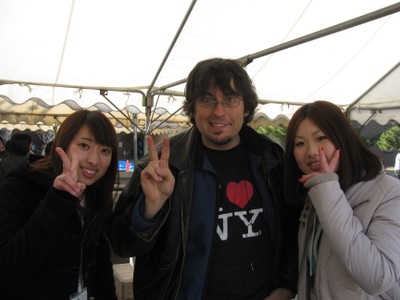Ben Lawson ’02

The JET Program: One Alum Becomes a Cultural Ambassador
Upon graduating from the University of North Carolina in 2002, Ben Lawson moved to Osaka, Japan to join the Japanese Exchange and Teaching Program, or JET, to become a cultural ambassador.
JET is aimed at promoting grass-roots international exchange between Japan and other nations and is the pre-eminent cultural and education exchange program between Japan and the United States. Young graduates from around the world assist in foreign language education in local governments, boards of education, and elementary, junior and senior high schools throughout Japan.
The goal of the program is to foster ties between Japanese youth and JET participants on a person-to-person level, with the hope that these relationships will deepen the world’s understanding of the country when JET participants finally return home.
Lawson certainly seems an excellent representative for Japan. He had always had a fascination with East Asian religion and aesthetics, and as a child had practiced Taekwon Do and watched Japanese animated cartoons. Lawson knew he wanted to learn more about Asia at college as a result.
“Given the rising eminence of China on the world stage at that time, and my experience as a child of the 80s [when Japan was an economic powerhouse], I thought East Asia would be a key player in the 21st century,” Lawson said. But hoping to work professionally after university on the world stage, he decided a background in the social sciences would be important and declared a double major International and Area Studies and Asia Area Studies.
While at the time Lawson did not appreciate the importance International and Area Studies places on interdisciplinary learning, he now credits this approach with providing him with the necessary tools to engage with different regions and topics.
“In forcing majors to mix cultural studies, political science, anthropology, language and economics classes, International and Area Studies gave me an holistic understanding of places and issues.”
Lawson immersed himself in his academic family. One year, he even lugged his own VCR from Craigie Dorm for a Japanese class, after the department’s broke. When he finally began to consider his future beyond UNC, his Japanese teacher encouraged him to apply to JET.
Lawson was excited about the opportunity to finally master the language that had so eluded him in college and after reading about JET’s mission, he was sold.
“The goal of the program is to promote English language education in Japan, encourage intercultural dialogue, expose Japanese citizens to foreign culture on a grassroots and personal level, and to create cultural ambassadors for Japan on a global stage.”
Lawson taught English at Abuno Senior High School in Osaka for five years. Initially he worked within the curriculum, but he soon began to teach a greater number of special needs classes.
While teaching, he became active in the Association for Japanese Exchange and Teaching—a voluntary association within the JET community—where he served as treasurer and eventually President. Through this organization, he increasingly became involved in coordinating fundraisers, particularly in the wake of the Fukushima disaster.
Lawson spearheaded Kansai Cares, a donation and food drive, in 2011. Kansai Cares partnered with small business owners to offer specials to individuals who donated goods and cash to victims of the tsunami. Meanwhile, the JET community became a point of contact for other expatriates seeking to help, and members mobilized to spread the word in their respective home countries of the need for aid.

But while Lawson loves Japan and will continue to think of the country as his second home, his experience as a JET opened his eyes to other areas of the world as well. The friends he made through JET inspired him to spend the last year on a working holiday visa in Australia. Lawson discovered that while in the program, he was just as much a cultural ambassador for the U.S. as for Japan, and not only for his students, but also his fellow participants.
If he had one piece of advice to impart to graduating seniors, it would be to see the world.
“My experiences abroad have broadened my mind so that no matter where I go, I am able to appreciate the strange and the familiar.”
